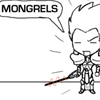| View previous topic :: View next topic |
| Author |
Message |
|
|
Han Solo
 Joined: 02 Feb 2011
Joined: 02 Feb 2011
Posts: 57
Location: Great Britain
|
 Posted: Thu Mar 24, 2011 1:03 pm Posted: Thu Mar 24, 2011 1:03 pm
|
 |
|
Okay, so I was reading an article on news regarding the live action Akira project and I stumbled upon this comment:
| Quote: | | I don't even consider Akira "Anime". It has none of the conventions or visual language. The character designs are not big eyed, blue haired freaks. There's no giant sweat drops or bleeding noses. Its an animated feature made by a Japanese team, but its not Anime. |
This reminds me of a very similar comment I read about Jin-Roh by some guy on IMBD.
So my question is there any set criteria for Japanese animation to be dubbed "anime". I thought Japanese animation itself was just called anime regardless of the style and conventions (or lack of) used.
I didn't know anime was an actual "style". This is what get's me very confused and going in circles when thinking about this. Ithought that anime artists tend to use a specific style but anime is not a style itself.
He also said:
| Quote: | | But Americans have a very specific view of an "anime". Hence the term American Anime when deviant art tweens copy that specific style. |
When things such as Avatar is dubbed an "American anime" it still doesn't make sense to me. It's just an american cartoon that borrows from a style used by most artists who draw anime.
|
| Back to top |
|
|
|
EricJ
 Joined: 03 Sep 2009
Joined: 03 Sep 2009
Posts: 876
|
 Posted: Thu Mar 24, 2011 1:20 pm Posted: Thu Mar 24, 2011 1:20 pm
|
 |
|
| Han Solo wrote: | Okay, so I was reading an article on news regarding the live action Akira project and I stumbled upon this comment:
| Quote: | | I don't even consider Akira "Anime". It has none of the conventions or visual language. The character designs are not big eyed, blue haired freaks. There's no giant sweat drops or bleeding noses. Its an animated feature made by a Japanese team, but its not Anime. |
|
Actually, it WAS anime--It just wasn't Dragonball Z or Sailor Moon.
(Hence the reviewer being a general @$$-hat.) 
And by the "It's either DBZ, Moon or Akira", we can guess how much exposure the reviewer HAS had with anime, which puts it under the definition of Stereotype.
You can generally pick out which stereotype, as we usually get a choice of four from the uninformed:
- "Anime?...Sure, I remember watching Speed Racer as a kid!"
- "Blue-haired girls? It's all porn!"
- "It's just big steroid guys grunting!" (Guess which years-overexposed CN-aired series created THAT one.)
- "Eh, I saw Akira at the college theater, did even they know what was going on?"
| Quote: | He also said:
| Quote: | | But Americans have a very specific view of an "anime". Hence the term American Anime when deviant art tweens copy that specific style. |
When things such as Avatar is dubbed an "American anime" it still doesn't make sense to me. It's just an american cartoon that borrows from a style used by most artists who draw anime. |
That also would be stereotype, albeit the more unctious kind from those who want to look like they understand it from the few shows they've seen/heard of, but don't.
When we have a show like Avatar where French fanboy-animators try to throw lil' Dragonball martial-arts-toddlers in with Nausicaa villages and have a few Ghibli creatures roaming around--and stateside non-fans believe its "Japanese" credentials completely--that's about as close to The Blind Leading the Blind as you can get. 
|
| Back to top |
|
|
|
Zin5ki
 Joined: 06 Jan 2008
Joined: 06 Jan 2008
Posts: 6680
Location: London, UK
|
 Posted: Thu Mar 24, 2011 1:28 pm Posted: Thu Mar 24, 2011 1:28 pm
|
 |
|
| Han Solo wrote: | | I thought Japanese animation itself was just called anime regardless of the style and conventions (or lack of) used. |
This conception, which certainly holds sway within many anime fan circles, partially explains the hostility directed towards the quotation you cite.
(More predominantly however, we might attribute those reactions to the noticeable disapproval of the project to which the quote pertains.)
|
| Back to top |
|
|
|
ikillchicken
 Joined: 12 Feb 2007
Joined: 12 Feb 2007
Posts: 7272
Location: Vancouver
|
 Posted: Thu Mar 24, 2011 3:42 pm Posted: Thu Mar 24, 2011 3:42 pm
|
 |
|
|
Well, it all comes down to whether you define anime as animation from Japan or more vaguely as a genre. I'm a firm believer that the more practical and logical definition is the former. In fairness though, I have to admit that anime is it is used in English is really just a borrowed word and so perhaps no definition can be called factually correct.
Of course, by the same reasoning put forth by that review, one could conclude that some of the best Hollywood movies are in fact, not Hollywood movies. After all, they do not conform to the stereotype of the loud, Transformers style Hollywood movie. I'm not sure that's a door one wants to open.
In any case though, there may be some validity to what the person is saying. However, I would draw a line between a legitimate alternate definition and empty snobbery. If you're willing to accept a broader categorization that doesn't just boil anime down to the most negative stereotypes then fair enough though.
|
| Back to top |
|
|
|
Key
Moderator
 Joined: 03 Nov 2003
Joined: 03 Nov 2003
Posts: 18552
Location: Indianapolis, IN (formerly Mimiho Valley)
|
 Posted: Thu Mar 24, 2011 3:47 pm Posted: Thu Mar 24, 2011 3:47 pm
|
 |
|
| Han Solo wrote: | Okay, so I was reading an article on news regarding the live action Akira project and I stumbled upon this comment:
| Quote: | | I don't even consider Akira "Anime". It has none of the conventions or visual language. The character designs are not big eyed, blue haired freaks. There's no giant sweat drops or bleeding noses. Its an animated feature made by a Japanese team, but its not Anime. |
This reminds me of a very similar comment I read about Jin-Roh by some guy on IMBD. |
Ugh. Idiots like the one you're quoting and referring to make my head hurt.
Any animation designed and primarily made in Japan (I have to say it this way because a lot of Japanese studios farm out grunt work to Koreans) is anime, regardless of what it looks like. This is the commonly-accepted Western definition of "anime," and that should not be debatable. To say that Akira isn't anime just because it doesn't look like most other anime titles is ludicrous.
That being said, there is such a thing as "anime style," and that refers to stylistic artistic conventions commonly - but not universally - found in anime titles. Avatar is one prominent example of this, and some would argue that Teen Titans was another. When people say "American anime," they are - or should be - referring to American animation done in "anime style," so a more accurate label would be "American anime-styled cartoons."
|
| Back to top |
|
|
|
egoist
 Joined: 20 Jun 2008
Joined: 20 Jun 2008
Posts: 7762
|
 Posted: Thu Mar 24, 2011 5:15 pm Posted: Thu Mar 24, 2011 5:15 pm
|
 |
|
|
Then what is The Tatami Galaxy? Alienimation or something like that.
I'll just agree with Key. This isn't even debatable. If it's animated and produced primarily in Japan it's anime.
|
| Back to top |
|
|
|
ikillchicken
 Joined: 12 Feb 2007
Joined: 12 Feb 2007
Posts: 7272
Location: Vancouver
|
 Posted: Thu Mar 24, 2011 6:29 pm Posted: Thu Mar 24, 2011 6:29 pm
|
 |
|
| Key wrote: | | Any animation designed and primarily made in Japan (I have to say it this way because a lot of Japanese studios farm out grunt work to Koreans) is anime, regardless of what it looks like. This is the commonly-accepted Western definition of "anime," and that should not be debatable. |
This has been my belief in the past as well. However, I'm honestly beginning to question it. As you said, the definition of anime is pretty much dependant on what the consensus is. But then, is it the case that your definition is the most commonly accepted? These days, judging by how often this question comes up and how divisive it is, I can't say for sure. At the very least, there is certainly a large chunk of fans who accept the style based definition instead.
So at this point, while I still agree that your definition is better, I would say that which is correct has become increasingly debatable.
|
| Back to top |
|
|
|
Kruszer
 Joined: 19 Nov 2004
Joined: 19 Nov 2004
Posts: 7994
Location: Minnesota, USA
|
 Posted: Thu Mar 24, 2011 6:50 pm Posted: Thu Mar 24, 2011 6:50 pm
|
 |
|
|
Yeah, I'm going to agree with Key as well. "Anime" is the correct term to use for animated works from Japan. If it was animated there than it is anime. It's also technically, animation, as well but for clarification and identification purposes when talking about it, it's better off being given the specific name, anime, because it's more descriptive. You can also call an orange a fruit too, but if you wanted an orange and tell someone to go out and buy you a fruit you might not end up with mixed results considering there's like a hundred different types of fruit.
|
| Back to top |
|
|
|
egoist
 Joined: 20 Jun 2008
Joined: 20 Jun 2008
Posts: 7762
|
 Posted: Thu Mar 24, 2011 7:10 pm Posted: Thu Mar 24, 2011 7:10 pm
|
 |
|
| ikillchicken wrote: | | So at this point, while I still agree that your definition is better, I would say that which is correct has become increasingly debatable. |
Oh, humanity. You just love to complicate simple matters, don't you? 
|
| Back to top |
|
|
|
TitanXL
 Joined: 08 Jun 2010
Joined: 08 Jun 2010
Posts: 4036
|
 Posted: Fri Mar 25, 2011 2:00 am Posted: Fri Mar 25, 2011 2:00 am
|
 |
|
Well it's not a cartoon either, since there's no ugly 3D plastic CG models or talking animals in it.  As a general rule, I tend to take what Americans say about anime with a grain of salt. As a general rule, I tend to take what Americans say about anime with a grain of salt.  Yes, I'm aware of the hypocrisy. Yes, I'm aware of the hypocrisy.
While it's silly to say there's an 'anime style', it's also silly to say anime is the same thing as American cartoons. There's some weird, undefinable trait I can't explain where I can look at a show and instantly tell if it's American or Japanese. Teen Titans and Avatar can try to ape and milk anime for all it's worth and throw in as many chibis as they want, but they're never going to 'trick' my radar. You can try to copy someone's art, but their technique and style is almost impossible to do. There's definitely cinematography styles, from obvious to subtle, that are exclusive to Japan, just by nature of growing up there and working in that environment that an outside will never be able to understand or do.
To me, I use anime as any show made in Japan with the intent of being Japanese. This means shows like Spider-Man the Animated Series and Tiny Toons are not anime, even if their production was all done in Japan and animated there, since they were written by and for Americans.
|
| Back to top |
|
|
|
Errinundra
Moderator
 Joined: 14 Jun 2008
Joined: 14 Jun 2008
Posts: 6602
Location: Melbourne, Oz
|
 Posted: Fri Mar 25, 2011 3:10 am Posted: Fri Mar 25, 2011 3:10 am
|
 |
|
|
While I agree generally that an animated show made in Japan is anime, I do wonder if there's a limit to how far you can go with that.
I'm thinking of La Maison en Petits Cubes, which, if I didn't know better, I wouldn't in my wildest dreams guess as anime. It is so foreign to my grasp of anime that it puts standard definitions in doubt.
|
| Back to top |
|
|
|
Nagisa
Moderator
 Joined: 19 Aug 2003
Joined: 19 Aug 2003
Posts: 6128
Location: Atlanta-ish, Jawjuh
|
 Posted: Fri Mar 25, 2011 3:47 am Posted: Fri Mar 25, 2011 3:47 am
|
 |
|
|
The primary definition I've always used when referring to anime is "any animated production where all or most of the core production staff (director, producer, writers, designers, etc.) are under the employ of a Japanese production studio." It's concise, specific, and rules out stupidity like "but they don't have big eyes and pink hair!" or "but the character designer is American!" or "but they farm their animation out to Korea!" So? Big eyes and goofy hair are not universal in anime (nobody with any sense is going to say AKIRA and Lupin III aren't anime, only idiots), that American designer received his paychecks in yen care of Sunrise, and typically anything farmed out is relatively mindless grunt work that has no bearing on the creative direction of the program (in-betweeners have no say in what goes on, in other words).
Anime's a bit of an odd duck in that it's the only animation medium that is defined by its nationality, but that's just how it is. And yes, technically "anime" in Japanese refers to all animation, and is an abbreviation of the Japanese katakana "a-ni-me-shu-n," but in just about every other language in the world, the term "anime" has been adopted and re-defined to specifically refer to a certain nationality of animation. It's as simple as that. The way it looks has no bearing, the genre tropes used have no bearing, the race of the person in the writer's or musical conductor's chair has no bearing. It's animation coming out of a Japanese studio, therefore it's anime, the end.
|
| Back to top |
|
|
|
Han Solo
 Joined: 02 Feb 2011
Joined: 02 Feb 2011
Posts: 57
Location: Great Britain
|
 Posted: Sat Mar 26, 2011 5:07 pm Posted: Sat Mar 26, 2011 5:07 pm
|
 |
|
Wow I'm actually loving all the answers I've been given, though to say it can't be a subject for debate? Well I only asked this because I genuinely needed clarity, because if one anime fan can turn around as claim Akira or Jin-Roh isn't an anime, then I assumed there'd be at least one anime fan who may have the same opinion and a sound reason.
When I used to watch Shin Chan as a kid I used to be very confused when people claimed Shin-Chan is an anime. I always thought that because the style was soooo different then surely it wasn't an anime. As soon I was a little bit older I just shoved aside the belief that anime was a style.
I COULD point the blame to so many things (NOTE: I'm sorta not placing so much heavy blame they're just relatively small things in my opinion but I sorta have nothing better to talk about these days) :
1."How to draw manga guides"
When I was young I thought manga was a style until I when I actually did my research I found out manga was just Japanese comics but done in a certain style, with particular conventions. Of course it'd be ridiculous to call it "how to draw in a style that is commonly used in Japan comic/animation". But calling it How to draw manga doesn't (In my opinion) help at all.
2. My school
Sorta something that me and me only can blame. Yeah there was a "Manga mural" 3 day event in my school (which I gladly co-ordinated, because I was one of the only ones who can actually draw anatomy very well (remind me to post some fan art some day  ) The way they talked about manga was kinda painful now I remember it wasn't very clear.... ) The way they talked about manga was kinda painful now I remember it wasn't very clear....
3. TV channels
Showing too much generic stuff (Pokemon, beyblade, Digimon, Monster Rancher etc) kinda made the impression that is all what anime consists of
Though I can only blame those things for the reason why not many people know the "real" definition, I can only say these MAYBE the reasons why there are people out there who don't consider the unconventional things as anime.
I don't know and nor do I care that anymore after reading your posts it's helped, thanks. 
| Nagisa wrote: | | "but they farm their animation out to Korea!" |
Wait wha!? Really?
|
| Back to top |
|
|
|
Jedi Master
 Joined: 28 Nov 2008
Joined: 28 Nov 2008
Posts: 400
|
 Posted: Sat Mar 26, 2011 9:41 pm Posted: Sat Mar 26, 2011 9:41 pm
|
 |
|
| Kruszer wrote: | | You can also call an orange a fruit too, but if you wanted an orange and tell someone to go out and buy you a fruit you might not end up with mixed results considering there's like a hundred different types of fruit. |
Then there's Blood Oranges, Navel Oranges, Juice Oranages... And lets not even get into Tangerines and Clementines!
Anime has influenced artists across the world. It makes sense that those who enjoy it would want to emulate it. As it becomes more global we may reach a point where it becomes necessary to specify "Japanese Anime" instead of merely "anime". Considering that the Japanese originally used the word "anime" to refer to all animation, it could be said that this is a natural evolution as things come full circle.
The influence of this style of art and storytelling may be too grand to limit to any geographical boundary on a map.
|
| Back to top |
|
|
|
Nagisa
Moderator
 Joined: 19 Aug 2003
Joined: 19 Aug 2003
Posts: 6128
Location: Atlanta-ish, Jawjuh
|
 Posted: Sat Mar 26, 2011 9:47 pm Posted: Sat Mar 26, 2011 9:47 pm
|
 |
|
| Han Solo wrote: |
| Nagisa wrote: | | "but they farm their animation out to Korea!" |
Wait wha!? Really? |
Yep. Anime studios farm out the menial in-between work just like many Western studios do. It's nothing major as far as the creative process of the production is concerned, typically just the mindless drawing of the frames of animation between key frames to link them together (key frames being the major poses and camera angles that need to be hit in a scene). As I understand it, the key frames are done in-house, and then that work is shipped out to the grunts to fill in the blanks.
| Jedi Master wrote: | | The influence of this style of art and storytelling may be too grand to limit to any geographical boundary on a map. |
Except that it's not necessarily a style. Big eyes and wild hair and lip flaps alone are not indicative of anime, just a very common occurrence. If we were to start defining what was and was not anime by these common visual tropes, we would wind up excluding a lot of integral, classic anime like AKIRA, Lupin III, Crayon Shin-chan, and even a good chunk of Studio Ghibli & Satoshi Kon's works that don't all fit the stereotypical mold. And for...what? Teen Titans? Or Jimmy Joe Bob's big-eyed "American manga?"
I think that the geographic definition for anime, while a bit unusual, fits it just fine. We've been using some form of that definition for decades now, and to suddenly have to rearrange the entire anime community's definition by re-applying it to a certain style would be an awkward, convoluted mess. Anime-influenced art doesn't have to be called "anime" to be appreciated. It's an offshoot from anime in the grand scheme of animation's evolution as a whole, and when that happens in the arts and music, the typical course of action is to give the newfound style its own designation. Rococo painting developed out of baroque, but baroque wasn't re-defined to fit in all the rococo painters inspired by it. Same with how new wave and alternative rock music weren't retroactively shoehorned into punk rock despite that being the inspiration for both. Anime-influenced art is an offshoot of anime with its own growing identity, so I'd hesitate to go backwards and re-work the established definition of what anime is just to lump it in.
|
| Back to top |
|
|
|
|